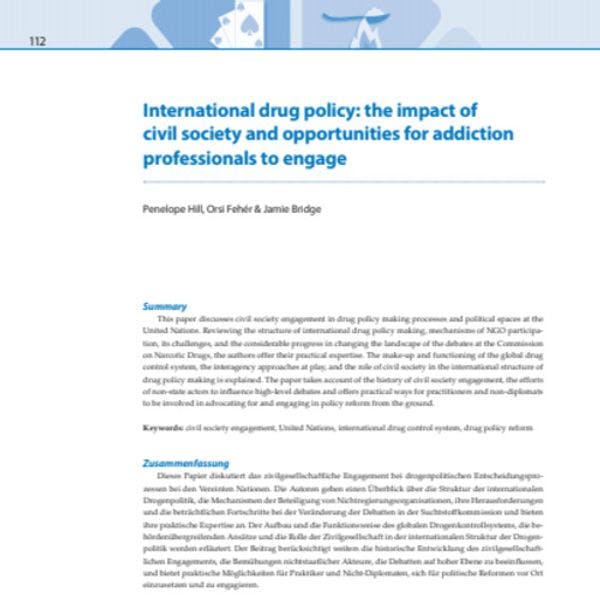Pabst Science Publishers
International drug policy: The impact of civil society and opportunities for addiction professionals to engage
By Penelope Hill, Orsi Fehér & Jamie Bridge
Civil society, including addiction practitioners, have been actors in policy spaces since United Nations (UN) drug control debates began under the Leagues of Nations (Bruun, 1975). Since the early 1990s, prime responsibility for UN drug-related matters has been held by Viennabased institutions. Although initially experiencing limited space for engagement with UN institutions and Member States, opportunities for civil society to influence international drug policy have grown, with the recognition of the importance of collaboration with non-government organisations (NGOs) increasing across all major UN agencies and institutions managing drug-related matters.
International debates and decisions directly influence and shape on-the-ground practice in the field of addiction. Though national policies are generally made on the state-level, signatories of the drug control conventions are bound to follow their commitments to the treaties and have limited sovereignty in unilaterally regulating internationally scheduled substances. The narratives, power-dynamics and decisions on the highest levels trickle down to regional policy making, so it is very important to shift the debate from substances to people at the highest level, so drug policies can operate effectively on the national level.
Civil society engagement and attendance at CND sessions throughout the year is crucial, in order to bring “real world” issues and the voices of affected populations to the forefront of the UN debates. Addiction practitioners are critical in relaying information on evidencebased practice to these forums, to ensure that international drug policies follow scientific evidence and not preconceived ideologies, and to guarantee health-centred and rights-based approaches prevail in the global drug control framework.
Downloads
Regions
Related Profiles
- World Health Organization (WHO)
- United Nations Office on Drugs and Crime (UNODC)
- United Nations
- International Drug Policy Consortium (IDPC)
- Harm Reduction Australia
